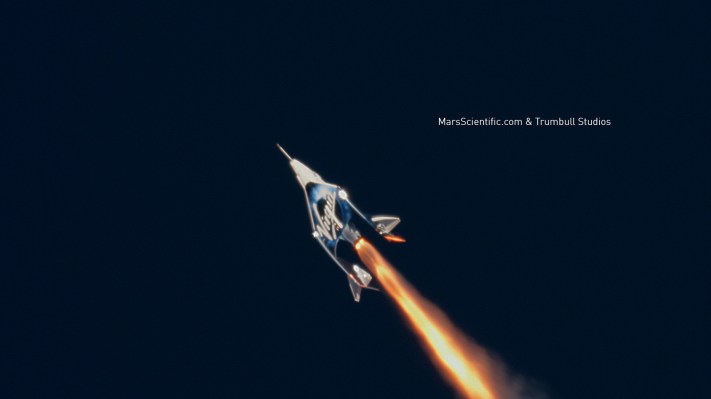The fourth test flight of Virgin Galactic’s SpaceShipTwo took its test pilots to the very edge of space this morning, reaching just over 52 miles of altitude and a maximum speed of Mach 2.9. It’s another exciting leapfrog of the aspiring space tourism company’s previous achievements.
Takeoff was at 7:30 AM against a lovely sunrise in the Mojave:
The actual spacecraft, SpaceShipTwo, was strapped to the belly of WhiteKnightTwo (VSS Unity and VMS Eve specifically) as the latter gave it a ride up to about 45,000 feet.
At that point SpaceShipTwo ignited its rocket engine and started zooming upwards at increasing speed. The 60-second burn of the engine, 18 seconds longer than the third test flight’s, took the craft up to Mach 2.9 — quite a bit faster than before.
After that minute-long burn SpaceShipTwo deployed its “feathers,” helping slow and guide it to a controlled re-entry. It had at this point reached 271,268 feet, approximately 51.4 miles or 82.7 kilometers. Here’s the view from that lofty altitude:
Now, space “officially” begins by international consensus at 100 km, at what’s called the Karman line. But space-like conditions begin well before that, and a planned altitude of around 80 km was good enough for NASA to load a set of microgravity experiments onto the craft. They even told Virgin “welcome to suborbital space.”
(Update: Virgin Galactic tells me they are basing entry into space on the fact that NASA and the Air Force both award “astronaut wings” to pilots who fly above 50 miles. Notably this is also generally the altitude at which aircraft are more or less no longer governed by traditional aerodynamic principles, having left the atmosphere behind.)
Some have also suggested space should officially start at 80 km instead. So while it may be debated whether Virgin Galactic went to space (the company is saying so), it definitely got close enough to get a taste of it. The next flight seems likely to reach the Karman line, as well.
And the pilots, Mark “Forger” Stucky and CJ Sturckow, are definitely astronauts. No question about that.
Virgin founder Richard Branson commemorated the event in a press release:
Today, for the first time in history, a crewed spaceship, built to carry private passengers, reached space. Today we completed our first revenue generating flight and our pilots earned their Commercial Astronaut Wings. This is a momentous day and I could not be more proud of our teams who together have opened a new chapter of space exploration.
